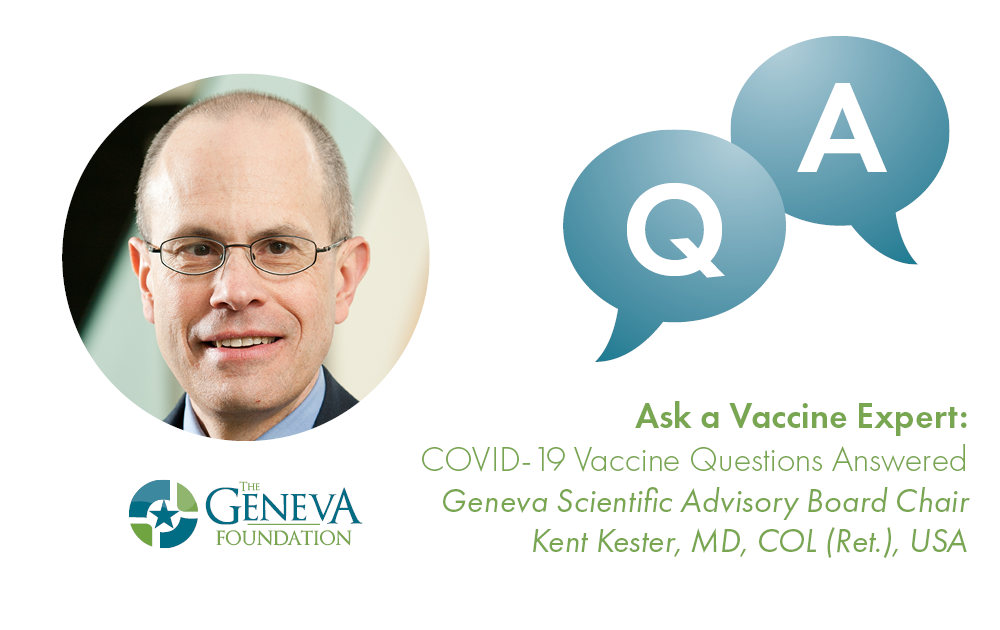24 August 2021
Ask a Vaccine Expert: COVID-19 Vaccine Questions Answered
The Delta variant is now the dominant strain of COVID in the world and the U.S. Food and Drug Administration (FDA) granted full approval for Pfizer’s COVID-19 vaccine on 23 August 2021. The distribution of three types of COVID-19 vaccines are underway and understandably, people still have a lot of questions. It can be difficult to keep up with all of the information – and misinformation – available, so we talked to one of the world’s top vaccine experts Geneva Scientific Advisory Board (SAB) Chair Kent Kester, MD, COL (Ret.), USA to help set the record straight.
Dr. Kester is the Vice President and Head, Translational Science and Biomarkers at Sanofi Pasteur. In this capacity, he leads a team of over 200 research and clinical professionals in the U.S. and France focused on the identification of novel biomarkers and the translational development of new vaccines. As Chair of Geneva’s SAB, he provides scientific consult, advisement, and direction to Geneva’s senior leadership, program directors, principal investigators, and research administrators.
Question: How were the COVID-19 vaccines developed so quickly? What steps were skipped?
Answer: We’ve been fortunate that the technologies utilized for the various COVID-19 vaccines developed for the U.S. market have been in place for a number of years. mRNA vaccines have been evaluated for a variety of emerging infectious diseases to include SARS and MERS. This made it much easier to reconfigure this platform in order to protect against another coronavirus—SARS-CoV-2—which is responsible for the current COVID-19 pandemic. While the timelines for the vaccine development have been truncated, the reality is that no steps were skipped. This is something that the FDA would never tolerate. There have been some innovative approaches to data submission, reliance on central laboratories for all sponsors being funded by the U.S. Government, and involvement of U.S. Government oversight in the clinical evaluation of the vaccines, and some of this Government engagement, from the start, has actually generated increased efficiencies that would not typically be present for other vaccine development programs.
Question: Now that the Pfizer vaccine is FDA-approved, does that mean it’s better than the rest? Does it increase the likelihood that other vaccines will be approved?
Answer: It doesn’t mean that it is better. Instead, the approval is reflective of the submission by Pfizer to the FDA of their full portfolio. We assume that other sponsors will do the same.
Question: Why hasn’t the FDA fully approved all three of the vaccines yet?
Answer: It is important to remember that vaccines are interventions intended for healthy people, unlike drugs that typically are focused on treating a specific medical condition. Because of this, the regulatory bar for safety is quite high. The FDA has a variety of regulatory steps, some of which are codified in law, that governs the review and approval of all vaccines. Some of this involves the clinical trials data and some of this is more related to how the vaccines are produced, quality control aspects, and other technical aspects. While the FDA is expediting its required evaluations, it is clear that no short-cuts are being entertained. Each vaccine file is being evaluated in a comprehensive manner. All indications suggest that there should be continued approvals of the vaccines currently being administered under Emergency Use Authorization (EUA) announced in the near term.
Question: How successful does a vaccine have to be for it to be granted full approval by the FDA?
Answer: It depends on a number of aspects: 1) what other vaccines are available and how well they protect; 2) the ease or complexity for protecting against the disease of interest; 3) issues related to the communicability and public health urgency; 4) an acceptable safety profile; and 5) a production process that is able to provide multiple lots of vaccine that are comparable in safety and effectiveness in preventing the disease of interest.
Question: I am worried about adverse effects that might come up after the period of the vaccine trials. What advice do you have for me?
Question: The FDA has mandated a variety of longer-term studies beyond the initial efficacy assessment period for all of the vaccines. Further, it will not be surprising if the FDA requires additional post-licensure studies whenever one or more of the current EUA vaccines received final licensure.
Question: Why are some people still getting infected with the Delta variant despite being fully vaccinated?
Answer: RNA viruses routinely mutate. Sometimes these mutations make a virus more infectious, but this may be associated with either increased or decreased virulence. Sometimes, vaccines may not be a complete “fit” for a mutated virus, like delta, however, it is clear that the currently available vaccines provide significant protection against severe disease, hospitalization, and death. In a somewhat analogous situation, there are people who get immunized with the yearly influenza vaccine (which typically protects against three or four viral types) who ultimately get influenza, yet their illness is likely much less significant than might be seen in people who are not immunized against influenza.
Question: What is so different about the Delta variant?
Answer: The delta variant appears to be associated with enhanced infectivity of people. As previously, in spite of this, the currently-available vaccines provide important protection against severe disease, hospitalization, and death.
Question: How do I know which COVID-19 vaccine is right for me?
Answer: While this is always a personal decision, the data is pretty clear—COVID-19 vaccines are an important public health measure to prevent infection and/or serious disease associated with this virus. Current data shows that those people presenting for medical care with serious COVID-19 disease are commonly those who are not vaccinated. Talk with your physician if you have questions.
Question: Should I get a booster shot?
Answer: There is already guidance related to people with certain immunocompromising diagnoses to receive a booster dose. And, once the FDA VRBPAC and the CDC ACIP weigh in regarding indications and policy for wider booster doses, we will all have a better understanding of who should be considered for a vaccine booster.
What questions do you have for Geneva’s vaccine experts? We would love to help answer them for you. Please email us your questions at marcom@genevausa.org and we will answer them for you in a future update.



